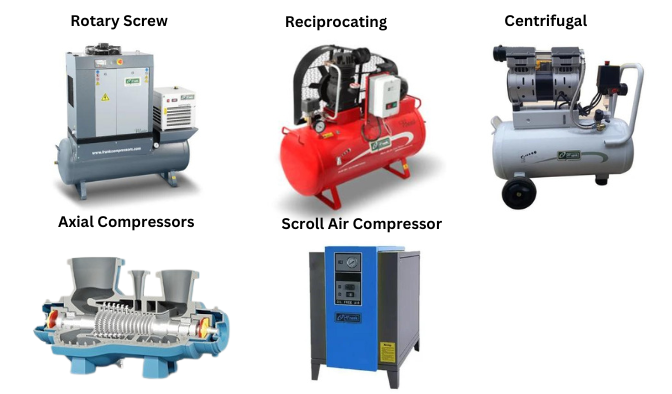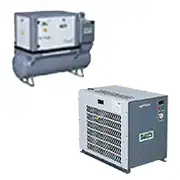Understanding The Different Types of Compressors
Compressors are essential in many industries, where they expand the pressure of gases and air for various purposes. These machines are crucial for tasks like operating equipment, facilitating production methods, and promoting effective production. The different types of compressor products are uniquely designed for specific industrial tasks, making them highly versatile. This blog will examine the most prevalent compressor varieties and their applications across various industries to improve efficiency and effectiveness.

1. Reciprocating Compressors
Many industries commonly use Reciprocating compressors or piston compressors. These compressors are recognized for their capacity to produce high pressure, making them suitable for tasks that involve periodic use. This is advantageous for industries that need high-pressure output but not continuously. They capture air or gas within a cylinder and then compress it using a piston's motion. It consists of essential parts, including the piston, cylinder, valves, crankshaft, and connecting rod. Single-stage compressors handle lower pressure, while multi-stage compressors suit applications that need higher pressure.
Different Types of Reciprocating Compressors
Reciprocating Air Compressor: Reciprocating air compressors use a piston mechanism to compress air. It allows them to produce high-pressure air efficiently in short intervals. They need little maintenance and excel in both small and large-scale operations. These compressors provide a budget-friendly option and ensure consistent performance in the long run.
Pet Air Compressor: Pet air compressors supply clean, dry, high-pressure air, commonly used for producing PET bottles. They consistently deliver the required air pressure, optimize energy use, and efficiently meet the specific pressure needs of blow molding, ensuring high-quality bottle production.
Dental Air Compressor: Dental air compressors supply oil-free, sanitary, and pure air for dental instruments. They work silently, lower maintenance needs by not using oil, and provide a steady stream of fresh air, which helps to keep a sterile setting and guarantees patient safety.
Oil-Free Piston Air CompressorOil-free piston air compressors provide clean, oil-free compressed air to avoid oil contamination. They reduce maintenance expenses and operate dependably in settings where air cleanliness is crucial. These compressors enhance energy efficiency and safeguard the quality of products and processes that demand high air quality.
Industries:
A reciprocating compressor compresses gas using a piston, delivering it at high pressure for industrial applications. Industries like gas transmission, petrochemical plants, and refineries rely heavily on these compressors. Their performance and efficiency depend on the quality of the design, maintenance, and operational practices. Since they are often critical and expensive equipment, ensuring proper care and attention helps improve their reliability, reduce costs, and extend their lifespan.
2. Rotary Screw Compressors
Rotary screw compressors operate by using two lock screws that link together and turn in opposite directions to trap and compress the gas. Gas enters through the inlet valve as the rotors turn and get compressed between the rotor lobes as the space between them reduces. This guarantees a steady and uninterrupted stream of compressed air or gas, making them perfect for continuous use. Key components include the airend, oil filter, oil separator, cooler, and control system. There are two types of rotary screw compressors: oil-injected, which utilizes oil for cooling and sealing, and oil-free, which provides uncontaminated air. Perfect for challenging settings, they offer exceptional efficiency, minimal noise, and substantial airflow.
Different Types In Rotary Screw Compressors
Oil Free Screw Air Compressors: Oilless screw air compressors generate clean air free from contaminants by eliminating the need for oil during compression. This design stops oil from contaminating the compressed air, ensuring its purity for sensitive uses. These compressors cut maintenance costs and do away with the need for oil changes.
Rotary Screw Air Compressors: Rotary screw air compressors, these are perfect for constant air supply projects that require an as they continuously compress air using two rotating rotors that link. They offer great efficiency, need little upkeep, and run quietly, ensuring durability and reliability for extended periods of use.
Direct Drive Transmission Screw Air Compressor: The motor in the Jumbo Series direct drive screw air compressor is directly connected to the compressor, decreasing energy waste and improving effectiveness. It provides consistent, secure air compression and is ideal for demanding tasks, reducing operational expenses.
Permanent Magnet Motor Screw Compressor The screw compressor with a permanent magnet motor utilizes a permanent magnet motor for increased efficiency and energy conservation. It provides reliable performance, decreases energy usage, and runs silently. This compressor is suitable for applications that need to run constantly and have optimal efficiency.
Industries:
Rotary screw compressors are commonly used in automotive manufacturing for group lines, food and beverage industries for packaging, and pharmaceutical industries for conveying products. Their durability and ability to operate without interruption make them a popular choice for large-scale industrial applications.
3.Centrifugal Compressors
These compressors are created for big-scale uses that require high flow rates at moderate levels of pressure. While the impeller rotates, it speeds up the gas towards the outer edge of the compressor. The fast speed changes to pressure through the diffuser, slowing down the gas and transforming its kinetic energy into static pressure. The high-pressure air compressor is a centrifugal compressor specifically for high-pressure tasks. These compressors provide a steady stream of stable, compact gas with low vibration and noise levels.
Industries:
Centrifugal compressors can commonly be seen in petrochemical plants, extensive HVAC systems, and facilities for processing natural gas. Tasks requiring fast and efficient compression of a large amount of gas, like power generation and industrial cooling systems, are crucial.
4. Axial Compressors
Axial compressors efficiently compress large volumes of air or gas with little energy loss. They are often utilized in settings that demand a steady, large amount of production, like in aerospace engines and power generation systems. Their design guarantees a consistent, dependable delivery of compressed gas while maintaining minimal operational noise and vibration. Axial compressors employ a sequence of moving and fixed blades to compress gas in a straight flow. The procedure starts when the gas goes into the compressor and passes through the spinning blades, which improves its speed. This high-velocity gas then passes through stationary blades that convert the kinetic energy into pressure energy. The design allows for continuous compression and is well-suited for high-flow applications.
Industries:
In aerospace, they are vital for jet engines, providing the necessary airflow for propulsion. In power plants, they contribute to electricity generation by compressing air or gas needed for combustion processes. Chemical plants rely on axial compressors to process significant amounts of gas efficiently. Their capability to manage high-flow rates makes them ideal for continuous, large-scale applications across these sectors.
5. Scroll Compressors
Scroll compressors operate by using two interlocking scrolls to compress air or gas. This design ensures a smooth, quiet, and highly efficient compression process. With more occasional moving parts compared to other types of compressors, they require less maintenance and offer increased reliability. Their compact and robust design makes them ideal for applications that need consistent airflow without excessive noise. Scroll compressors are especially suited for small to medium-scale operations, providing effective and reliable performance in peaceful environments.
Industries:
These are commonly used in both residential and commercial areas, as well as HVAC systems. Scroll compressors are utilized in the medical industry to meet refrigeration and air conditioning requirements. The electronics manufacturing industry depends on them for accurate cooling. Mainly, Oil-free scroll air compressors are widely used in the medical industry, particularly for applications requiring clean and uncontaminated air, such as in hospitals and dental clinics.
Additional Equipment for Air Compressors
Portable diesel engine-driven air compressors are effective in outdoor locations and low electricity areas. These compressors provide pressurized air for activities such as construction, mining, and industrial maintenance. Their robust construction guarantees dependable functioning and continuing durability in difficult environments.
Refrigeration air dryers eliminate moisture from compressed air through the cooling process. When the temperature decreases, water vapor condenses and is taken away. This procedure prevents rust and corrosion in air tools and equipment, guaranteeing optimal performance and increased longevity. Refrigeration air dryers are necessary for maintaining superior air quality, especially in manufacturing and automotive maintenance.
Air receivers store and hold compressed air, stabilizing pressure changes and ensuring constant airflow. They also aid in separating and eliminating moisture from the air before reaching your equipment. Air tanks help maintain steady pressure and increase the effectiveness of your air compressor setup.
Vacuum Pumps and Related Systems
Piston vacuum pumps generate a vacuum through the piston extracting action from a chamber. They are suitable for use in labs, medical equipment, and packaging requiring high levels of vacuum. These pumps play a critical role in tasks that demand accurate control and a regulated setting.
Rotary vane vacuum pumps generate a vacuum with spinning vanes inside a chamber to remove air. They provide a dependable and consistent vacuum for a range of purposes, such as industrial operations, auto maintenance, and food production. Renowned for their longevity and minimal upkeep requirements, rotary vane vacuum pumps function effectively and have a lengthy lifespan.
Some Common Maintenance Tips for All Types of Compressors
-
Regularly Check and Replace Filters Keep air and oil filters clean to ensure efficient airflow and lubrication. Replace clogged filters promptly to avoid reduced efficiency and potential damage.
-
Monitor and Maintain Proper Lubrication Regularly check oil levels and quality to ensure smooth operation. Use the recommended oil and replace it as needed to prevent excessive wear on moving parts.
-
Inspect Belts and Connections: Examine belts, stockings, and connections for signs of wear and any damage. Adjust any loose parts and replace any damaged components to control malfunctions and uphold efficiency.
-
Conduct Regular System Checks and Servicing: Arrange appointments for regular maintenance inspections with a skilled technician to evaluate the condition of the compressor. Regular maintenance helps to identify and solve issues early on, ensuring reliable performance and extending the compressor lifespan.
-
Clean and Inspect the Cooling System: Inspect and clean the cooling system, including fans and condensers, to make sure they are clear of trash. This stops excessive heat and keeps performance efficient.
Recent Blogs
-
How Energy-Efficient Compressors Cut Industrial Power Costs
-
Single vs Two-Stage Reciprocating Air Compressor Overview
-
Top 10 Air Compressor Manufacturers in Coimbatore
-
Air Compressors for Electronics & Semiconductor Industry
-
Smart Air Compressors with IIoT & Remote Monitoring
-
Understanding Oil-Free Scroll Air Compressors & Advantages
-
Oil-Free vs Oil-Injected Compressors for Textile Industry
-
The Role of Medical Air Compressors in Modern Healthcare
-
Tips to Pick The Best High-Pressure Compressor For Business
-
Key Things to Check Before Installing a PET Air Compressor
-
Full Guide For How Diesel-Powered Screw Compressors Work
-
Benefits of Dual-Stage and Single-Stage Air Compressors
-
How to Silence an Air Compressor for a Peaceful Workspace?
-
Expert Tips to Select Screw Air Compressor For Packaging
-
Benefits of Oil-Free Air Compressors For Food & Beverage Safety
-
The Importance of Refrigeration Air Dryers in Pharma Production
-
Why Choose a Permanent Magnetic Energy Saving Compressor
-
Industrial Diesel-Driven Screw Compressors For Remote Locations
-
The Importance of Air Compressors in Laser Cutting Machines
-
How Dental Air Compressors Benefit the Medical Sector
-
Key Applications and Benefits of Piston Vacuum Pumps in Industry
-
Understanding The Role of Air Dryers in Compressed Air System
-
Why Choose Rotary Screw Air Compressors: Essential Advantages
-
Innovative Design Features of Screw Compressors with VFD
-
Which One to Choose: Piston Vacuum Pumps vs Rotary Vane Vacuum Pumps?
-
A Step By Step Guide For Air Compressor Installation & Setup
-
Tips For Improve Your Compressor Life Span
-
Different Types Of Compressors And Their Uses In Industries
-
High-Pressure Air Compressors: Uses and Advantages for Industrial Solutions
-
How Air Compressors Are Transforming The Textile Industry ?
-
Tips For Prolonging Your Air Compressor’s Lifespan






























